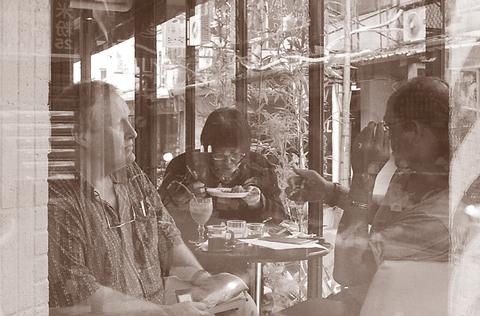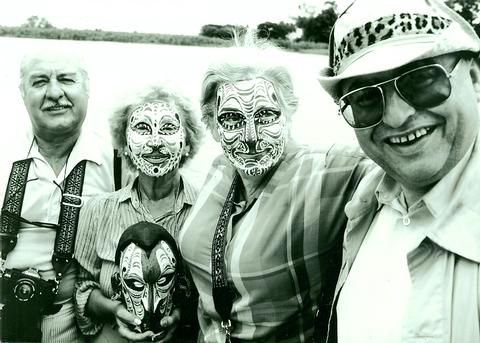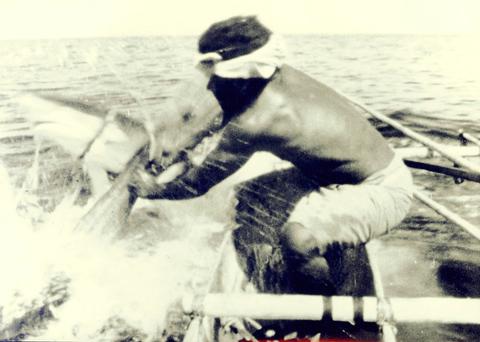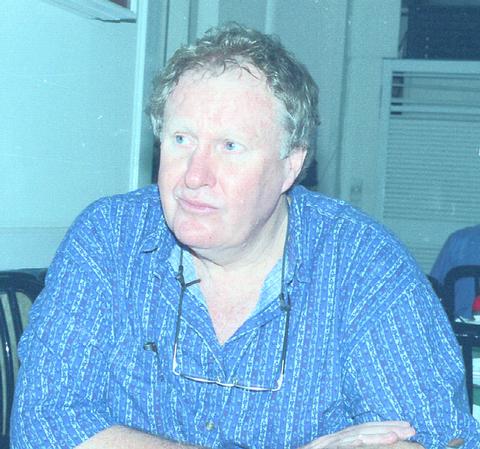The First Taiwan International Ethnographic Film Festival (
Despite a last-minute relocation due to flooding from Academia Sinica's own auditorium to the Majestic Theater (真善美), the festival, which has been in preparation since the beginning of the year will take place as scheduled.

FILM: COURTESY OF TIEFF
The festival is the work of Hu Tai-li (

The event will showcase many directors who fall into the ethnographic documentary category, most notably three films focusing on Bali by Margaret Mead, the celebrity anthropologist who popularized what many viewed as an arcane academic field and opened a way to a more holistic approach to cultural studies.
Mead, who died in 1978, was a pioneer in expanding the appeal of ethnographic film, which has become an increasingly popular way of documenting a vanishing world of marginal cultures. Nonetheless, since the films were made, Mead's work has come in for considerable criticism regarding their factual accuracy and the imposition of her own agenda.

One of the guests at the festival is Dennis O'Rourke, who is no stranger to controversy. The Good Woman of Bangkok came under vociferous attack at the 1992 Sydney Film Festival, where he faced accusations of violating the fundamental principles of documentary film making. In fact, O'Rourke claims that he is subverting the terms of a contract between the filmmaker and his audience in ways that question filmmakers' "higher claims to truth in the documentary film genre."

At the heart of controversy
Hu, whose own academic and film-making career have given her close personal links with the material she covers, defended her choice of O'Rourke's films, saying that the crucial aspect of ethnography is to look at similarities and differences. This, she said, applies both to cultures and the films selected.

PHOTO: IAN BARTHOLOMEW
At a press conference for the opening of the festival, O'Rourke questioned whether he was an ethnographic filmmaker at all, saying that he saw traditional "ethnography" as "simply and extension of the whole colonial project ... [it connotes] white people talking about black people or brown people, or powerful people talking about disempowered people."
He suggested that if the term ethnography unburdened itself of various academic and colonial baggage, and concentrated on the etymology of the word, "ethno, man or woman, and graphy, to write, then we are simply writing stories about people. ... And we all need to tell stories about ourselves."
The opening film of the festival is Cannibal Tours. It is far from being O'Rourke's most controversial film, but it does show many of the features that make his films so distinctive.
Cannibal Tours relates the interaction of a group of European tourists visiting a village in Papua New Guinea in which cannibalism had once been practiced. O'Rourke makes little attempt to hide his own involvement in the process of representing the interaction of natives and tourists, and the undermining of comfortable concepts about the relative positions of modern versus primitive culture.
The tourists in the film, with their casual talk of "savages" and "primitive culture," are at once repulsive and disturbingly normal. The film's primary focus is on interpersonal behavior and is carefully nonjudgmental. The director himself is part of the movie as an interviewer. In O'Rourke's own terms, he "is implicated" in the process of what he is filming.
With Cannibal Tours, O'Rourke began his "concern on reflecting on the process" of how documentaries are made and in The Good Woman of Bangkok and Cunnamulla goes even further "in flushing out [people] who are not interested in the expression of an ultimate idea of truth with all its messy and upsetting ramifications."
It is this messiness that constitutes O'Rourke's art -- his intense engagement with life which refuses any "truth in a box" dispensed by academics.
"They know they can't make films like I make, because they are essentially academics, they are not artists. But they do like my films and I appreciate that. I am personally generous to them, but it doesn't mean I won't criticize their work, because if I don't, then who does?" he told the Taipei Times yesterday.
Establishing a link
It is the lack of humanism that upsets O'Rourke in some ethnological films, and he constantly emphasizes making the relationship between filmmaker and subject explicit. "It's like this little tiny experience this morning," he said, relating an encounter he had experienced earlier at his hotel.
"We went to check the room with a very young, very frustrated hotel clerk and she said this thing to me. She said `I hate my job, I hate this place.' It was the first moment of intimacy between me and her and the reason why it occurred was because I came across to her as a person who was not false ... that was a little moment of communication, because when you make a film it is that process writ large. In all my films I get so close to the people, because you have to."
For all that, O'Rourke is powerfully aware of the manipulative nature of the relationship, "because you do it all to get the result." Having said this, he returned to the rejection of claims to truth that documentary films often make for themselves.
"This is a film, an artifact, it can never be reality ... I made it. When you watch Cannibal Tours, what you experience is the film, not reality," he said.
Apart from three films by O'Rourke, there are many other excellent films that will be screened, which span a whole spectrum of what Hu puts under the umbrella of ethnographic film.
The closing film of the festival, And Deliver Us From Evil (
O'Rourke quoted entertainer Quentin Crisp in relation to making good ethnographic films: "No one is boring who tells the truth about themselves." The best of the films on offer will have lots of truth, although it will perhaps not be as self-evident as we might expect.
Detailed information about individual films and their screening times is available in Chinese and English at the festival's Web site, http://www.tieff.sinica.edu.tw
Performance Notes
What: First Taiwan International Ethnographic Film Festival
When: Today to Sept. 25
Where: Majestic Theater (真善美戲院), 116 Hanchung St., Taipei (台北市漢中街116號)
Tickets: NT$600 for a five-day pass, NT$250 for a one-day pass, NT$100 per screening.

One of the most important gripes that Taiwanese have about the Democratic Progressive Party (DPP) is that it has failed to deliver concretely on higher wages, housing prices and other bread-and-butter issues. The parallel complaint is that the DPP cares only about glamor issues, such as removing markers of Chinese Nationalist Party (KMT) colonialism by renaming them, or what the KMT codes as “de-Sinification.” Once again, as a critical election looms, the DPP is presenting evidence for that charge. The KMT was quick to jump on the recent proposal of the Ministry of the Interior (MOI) to rename roads that symbolize

On the evening of June 1, Control Yuan Secretary-General Lee Chun-yi (李俊俋) apologized and resigned in disgrace. His crime was instructing his driver to use a Control Yuan vehicle to transport his dog to a pet grooming salon. The Control Yuan is the government branch that investigates, audits and impeaches government officials for, among other things, misuse of government funds, so his misuse of a government vehicle was highly inappropriate. If this story were told to anyone living in the golden era of swaggering gangsters, flashy nouveau riche businessmen, and corrupt “black gold” politics of the 1980s and 1990s, they would have laughed.

It was just before 6am on a sunny November morning and I could hardly contain my excitement as I arrived at the wharf where I would catch the boat to one of Penghu’s most difficult-to-access islands, a trip that had been on my list for nearly a decade. Little did I know, my dream would soon be crushed. Unsure about which boat was heading to Huayu (花嶼), I found someone who appeared to be a local and asked if this was the right place to wait. “Oh, the boat to Huayu’s been canceled today,” she told me. I couldn’t believe my ears. Surely,

When Lisa, 20, laces into her ultra-high heels for her shift at a strip club in Ukraine’s Kharkiv, she knows that aside from dancing, she will have to comfort traumatized soldiers. Since Russia’s 2022 invasion, exhausted troops are the main clientele of the Flash Dancers club in the center of the northeastern city, just 20 kilometers from Russian forces. For some customers, it provides an “escape” from the war, said Valerya Zavatska — a 25-year-old law graduate who runs the club with her mother, an ex-dancer. But many are not there just for the show. They “want to talk about what hurts,” she